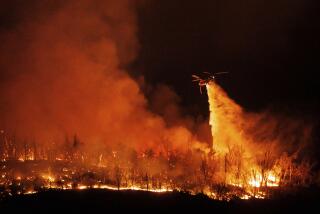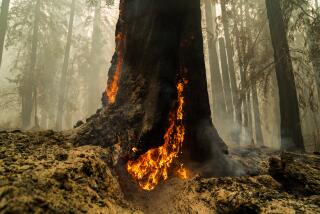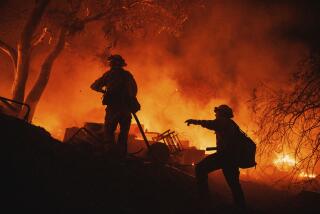Op-Ed: The Camp fire wiped out everything we had and nearly everything we’re familiar with
I am writing this just days after the Camp fire wiped out everything we had and nearly everything we were familiar with. We lived in Magalia, farther up the ridge from Paradise. Both towns have simply ceased to be, except for an oasis here or there, a mobile home or a business spared by the vagaries of wind or fire suppression efforts.
The survivors are scattered, gone to stay with relatives, friends or whatever temporary shelter they could find. We have moved in with our daughter in Sacramento, far from the fire though the smoke has followed us here. People are wearing those white masks meant to protect them from particulates in the air at levels well above what is considered healthy. We joke that minute flecks of our house and our possessions are in that smoke, following us.
Our house and our possessions: just memories now. Two bedrooms, two baths, two-car garage. Nothing at all special about it, though it was perfect for a retired college English teacher and his wife. It contained a lifetime of stuff, a curated museum of our lives, our travels, our loved ones.
Remembering what has been lost is like opening a door on a room we don’t really want to enter. Inside are scenes of times shared and objects loved. The objects are gone — the pictures on the walls, the Christmas tree ornaments that dated back decades, the cards and letters that marked anniversaries, birthdays and daily life, treasured gifts and quotidian necessities.
Our sense of disorientation grows with each passing day as we struggle with the reality imposed on us.
Our sense of disorientation grows with each passing day as we struggle with the reality imposed on us. First the fire, then the protracted escape: to Chico in a cavalcade of cars creeping through forest not yet engulfed by flames. What usually takes no more than an hour took most of the day.
And now comes the tyranny of bureaucracy. An array of technological obstacles and menus and instructions keep us from speaking with or getting help from actual human beings. We have been thrown into a pit of paperwork, usually sans paper: forms that have to be filled out for damn near everything: change of address, insurance claims, FEMA applications, checking account holds on auto-pay for services no longer needed or rendered.
On hold, we hear bad music, and occasional reminders that someone will speak to us sooner or later, assuring us that our call is important. There is an irony in the fact that the primary sources of information are also often the most robotic, the most remote. It’s a Disneyfied world of very real disaster, with happy music and chirpy voices that could hardly seem less appropriate.
Irritability pays occasional unwanted visits. Tears come, too, of course, brushed aside because they are prompted by self-pity that seems inappropriate when so many others have lost so much more. As I write this, 63 are confirmed dead in the Camp fire, and more than 600 are missing.
Even knowing that, there are petty regrets that shouldn’t matter, but somehow insist that they do. On the day before we fled the fire, we went shopping at Costco, and spent a couple hundred bucks on groceries the fire would take just hours after they were unloaded. A few days before that, we had our septic tank pumped. There were almost-new tires on the charred husk of a 15-year-old Subaru sitting on its rims in front of where our house used to be.
The redwood trees I planted to cloister us there are all gone, of course, as are many of the native trees that welcomed us when we moved in nearly two decades ago. The rose bushes are gone, the winter firewood is gone, an odd thing to think about in the context of fire.
Enter the Fray: First takes on the news of the minute from L.A. Times Opinion »
But that’s how this goes. Odd things to think about come to mind constantly, things now ridiculously irrelevant. Attention flits from immediate and pressing concerns to annoyances and minutiae and then to unfocused thoughts about where and how to live next, the enormity of irrevocable change.
What we have come to know, what we are experiencing, is being repeated up and down the state, from what was Paradise to what was Point Dume. We know hearts go out to those of us who lost loved ones or pets or family photos or everything. Thoughts and prayers, sincerely uttered and sincerely received.
It’s customary to end pieces like this on an upbeat note. Magalia strong. Paradise strong. We will be resettled. We will rebuild. Our days will take on routines similar to the ones we used to know, with new pictures on new walls, new rose bushes, new neighbors. The disorientation and the sense of loss will fade, but what is gone will never be entirely forgotten. Not the flight from fear and fire, not the flames rising over the ridge.
Jaime O’Neill is a writer in Northern California.
Follow the Opinion section on Twitter @latimesopinionand Facebook
More to Read
A cure for the common opinion
Get thought-provoking perspectives with our weekly newsletter.
You may occasionally receive promotional content from the Los Angeles Times.






